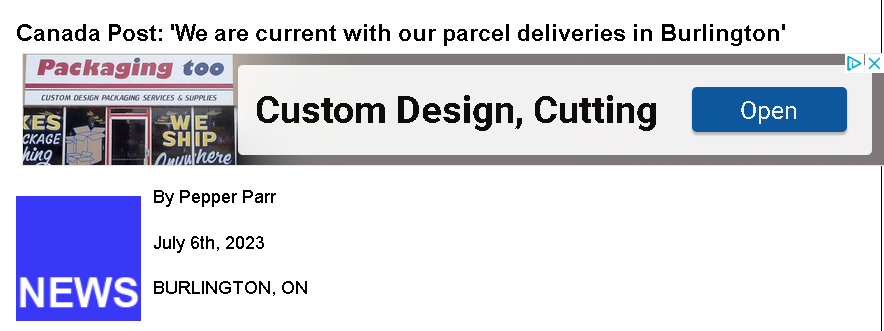 By Pepper Parr
By Pepper Parr
July 6th, 2023
BURLINGTON, ON
What does the announcement yesterday that the federal government is suspending its advertising on Facebook and Instagram mean to you?
The move, which saw the province of Quebec and city of Montreal follow suit within hours, comes on the heels of digital giants Google and Meta banning Canadian news content from their platforms in response to the Online News Act (Bill C-18).
Bill C-18 became law on June 22 and requires companies like Google and Facebook to pay for Canadian news content posted to their sites.
Aaron Mauro, Associate Professor and Chair of Brock’s Department of Digital Humanities, says it is “important for Canadian federal and provincial governments to enforce the principles of this legislation with common sense actions like the advertising suspension announced July 5.”

The business fundamentals of the newspaper business changed with the introduction of the internet. The print side of media has yet to figure out a new business model – government support isn’t the answer.
While it is no secret that these large American corporations are using Canadian content on their platforms, Mauro says the relationship is often presented as mutually beneficial because Facebook or Google can populate their web pages with free content while Canadian news sites benefit from greater traffic, resulting in higher revenue.
But, says MAuro, the system is not serving Canadian news organizations in the long term. With Bill C-18, the Canadian government is enforcing a system where local and national news will share in a larger portion of profit largely received by these U.S. companies.
“Simply put, Alphabet/Google and Meta/Facebook are using their market positions to pressure Canadian regulators to favour their interests at the expense of domestic news organizations,” Mauro adds.
“In my opinion, high quality journalism is critical to the functioning of our democracy, so these actions by Google and Facebook can be regarded as anti-democratic,” Mauro says. “It may be time to have a conversation about building a Canadian-owned social media platform comprised of a consortium of news organizations, citizen groups and government regulators.”

The advertisement you see beneath the headline is dropped in place by Google. We get pennies for each ad and we have little control over what appears.
The European Union (EU), for instance, is launching its own platforms, EU Voice and EU Video, which were announced last year.
The caution here is this: Do smaller, local Canadian online news operations really want the federal government in bed with us. How do we hold them accountable when they are putting money in our pockets?
 Mauro is part of a Brock research team identifying and evaluating the impacts of social media and how algorithmic bias is shaping young people’s engagements with political and social issues.
Mauro is part of a Brock research team identifying and evaluating the impacts of social media and how algorithmic bias is shaping young people’s engagements with political and social issues.
Aaron Mauro, Associate Professor and Chair of Brock’s Department of Digital Humanities.

















